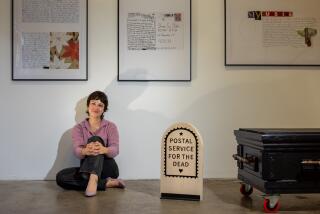A Mysterious Campaign of Anonymous Mail
- Share via
Shortly after I had begun my research--and shortly after I had informed Kitty Kelley by mail that I was proceeding with the story, interview or not--anonymous mail began to arrive. The mail wasn’t threatening, just strange. And eerily predictable.
“Oh, you can expect about 90 days’ mayhem by mail,” said an attorney who has worked with Kelley. Four journalists who have written about Kelley had also talked about receiving mysterious mail: untraceable names signed to letters with no return address, containing true and false information about Kelley, the journalists or their employers. Most often the letters were impassioned defenses of Kelley and her work, and intensely specific. Some were unsigned, with no return address. Sometimes the letters were on corporate stationery, from Time Inc., Fortune, the Washington Post. Some were mildly obscene and vaguely threatening. During and after reporting on Kelley, some journalists have gotten strange phone calls and lots of hang-ups.
A Barrage of Mail
The postal barrages are a joke to some recipients, rankling to others. After printing an item about an unauthorized biography of Kelley in the works (a book to be called “Bimbo: The Kitty Kelley Story”), Liz Smith says she got a stinging letter signed “Disgustedly” from Barbara Regenstein--no return address--haranguing her for betraying her longtime friend Kelley. It mentioned material that Kelley had, but did not publish in “His Way,” concerning derogatory remarks Ol’ Blue Eyes made about Smith. Smith wondered who could know this bit of trivia.
Jonathan Yardley, who panned the Liz Taylor book in 1981 and got a gilded Gucci box of fish heads signed “From the friends of Kitty Kelley,” says he was puzzled and amused by this coven of Kelley loyalists. “I’ve heard that she still vigorously denies it was her, and I can believe that,” he says. “But the question persists: Who is behind these campaigns?”
Sent for Analysis
Could Kelley be involved in the letter campaigns? Her lawyer says no, Kelley would not “engage in such actions directly or indirectly.”
In pursuit of this story, I received an assortment of letters and news clippings. The notes had begun to fall into a pattern, paralleling my research and my travels rather closely. Clearly someone was watching, anticipating. Could the same person be operating on both coasts?
The notes were sent for analysis to Dr. David A. Crown, a forensics expert who was chief of the CIA Questioned Documents Laboratory for 15 years. A renowned expert witness, Crown was called in to identify the handwriting of Nazi war criminal Josef Mengele and to examine documents relating to the World War II activities of Kurt Waldheim. Often, he is consulted for his expertise in handwriting and typewriter analysis.
In addition, an envelope sent to the Washington Post was also given to Crown. Crown compared the envelope with the samples of the business correspondence of Kelley sent to various people. Laboratory analysis confirms that the same distinctive machine, with telltale broken serifs and tilted letters, typed both the envelope, and the samples of Kelley’s correspondence.
In July, syndicated columnist Liz Smith received in New York a clipping of a society page photo featuring talk-show host Larry King with his arm around Kelley at a book party here for Pat Buchanan. The envelope was mailed from Washington. There was a typed one-line, anonymous message attached: THIS IS A HOT TICKET ROMANCE.
Smith printed a speculative item after making a few phone calls, and Larry King called, demanding a correction. He said then that he had no idea who could have sent the anonymous tip.
Again, analysis by Crown concluded that the same machine that typed this message and envelope to Liz Smith was the same one used for the anonymous letters sent to the Post. And all matched the type samples provided him of Kelley’s business correspondence.
When asked whether Kelley owns such a typewriter, her attorney said that he checked with her office and was advised that “no such machine is owned.”
More to Read
Sign up for our Book Club newsletter
Get the latest news, events and more from the Los Angeles Times Book Club, and help us get L.A. reading and talking.
You may occasionally receive promotional content from the Los Angeles Times.






